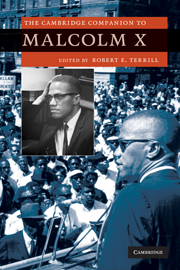Book contents
- Frontmatter
- Introduction
- 1 Malcolm X and Elijah Muhammad
- 2 Autobiography and identity: Malcolm X as author and hero
- 3 Bringing Malcolm X to Hollywood
- 4 Malcolm X and black masculinity in process
- 5 Womanizing Malcolm X
- 6 Malcolm X and the Black Arts Movement
- 7 Malcolm X and African American conservatism
- 8 Malcolm X and youth culture
- 9 Homo rhetoricus Afro-Americanus: Malcolm X and the “rhetorical ideal of life”
- 10 Judgment and critique in the rhetoric of Malcolm X
- 11 Nightmarish landscapes: geography and the dystopian writings of Malcolm X
- 12 Afrocentricity and Malcolm X
- 13 Malcolm X in global perspective
- 14 The legacy of Malcolm X
- Guide to further reading
- Index
1 - Malcolm X and Elijah Muhammad
Published online by Cambridge University Press: 28 May 2010
- Frontmatter
- Introduction
- 1 Malcolm X and Elijah Muhammad
- 2 Autobiography and identity: Malcolm X as author and hero
- 3 Bringing Malcolm X to Hollywood
- 4 Malcolm X and black masculinity in process
- 5 Womanizing Malcolm X
- 6 Malcolm X and the Black Arts Movement
- 7 Malcolm X and African American conservatism
- 8 Malcolm X and youth culture
- 9 Homo rhetoricus Afro-Americanus: Malcolm X and the “rhetorical ideal of life”
- 10 Judgment and critique in the rhetoric of Malcolm X
- 11 Nightmarish landscapes: geography and the dystopian writings of Malcolm X
- 12 Afrocentricity and Malcolm X
- 13 Malcolm X in global perspective
- 14 The legacy of Malcolm X
- Guide to further reading
- Index
Summary
Elijah Muhammad rarely granted press interviews. His reluctance to indulge reporters was at least partially due to a history of unflattering news coverage of his organization, the Nation of Islam, which was routinely characterized in the media as racist, extremist, and un-American. Moreover, Muhammad's modest formal education and advanced age - he was in his early sixties when his group became the object of dubious press scrutiny in 1959 - further discouraged active engagement with news organizations that were largely in the hands of whites hostile to his message. His last significant encounter with newsmen took place in January 1972 in the comfort of his Chicago mansion. It was a far-reaching exploration of topics, ranging from matters of theology (he reaffirmed a decades-long commitment to a racially exclusivist iteration of Islam) to his own reaction to dissenters within the Nation (he summarily dismissed their influence as negligible). A press inquiry about one apostate in particular did elicit specific comments from Muhammad, even though the individual in question had died several years earlier. When asked about Malcolm X, a former national minister of the Nation, Muhammad appeared roiled by the query. “I would not lose any time with a man that has been talked and talked about for years,” Muhammad shot back, before veering away into other subject matter.
- Type
- Chapter
- Information
- The Cambridge Companion to Malcolm X , pp. 10 - 25Publisher: Cambridge University PressPrint publication year: 2010
- 1
- Cited by



